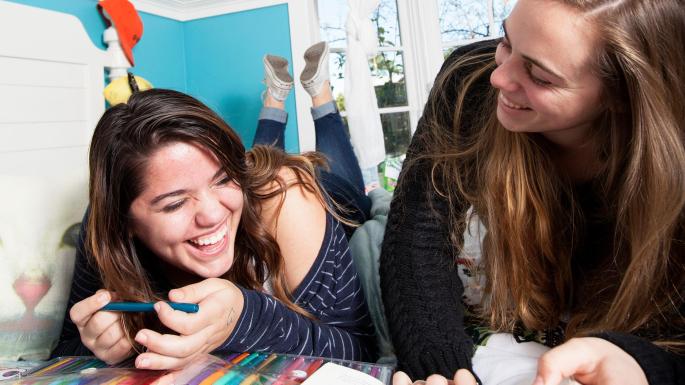Affluent, time-poor British parents are responsible for a youth mental health epidemic, top psychologist Steve Biddulph tells our columnist

efore I ring the childcare guru Steve Biddulph, I take a deep breath. Some of the things he has said to me and about me in the two emails preceding our call, I find personally upsetting. The judgmental tone and forthright opinions in these mails surprised me, given everything I’d read about the highly respected, softly spoken 63-year-old Australian, who lives in gentle Tasmania and keeps wombats for a hobby.
Biddulph is a psychologist known for his 2010 bestseller Raising Boys. Now he has a new book, about raising girls: 10 Things Girls Need Most to Grow Up Strong and Free.
In the missives, Biddulph has rebuked me for allowing pictures of my four children, aged 5 to 14, to appear in this newspaper. He has chided me about exploring cognitive behavioural therapy during a bout of anxiety I wrote about two years ago: just screwing the lid tighter, he says. He has told me my career success comes at great cost, then goes on to write that he blames affluent, successful, middle-class, time-poor working parents (people like me and you) for the mental health epidemic among young people that is sweeping Britain today. He calls us spineless, gutless parents and says he can’t “think of a childhood worse than what most Britons aspire to” for their children.
Biddulph believes we need to cut our working hours immediately; he recommends we take our children out of junior school for a year off to travel. In extreme cases, he suggests we “walk away” from our hyper, capitalist lives and head to smaller communities where family is central to the way of life.
He wants us to spend more time with older people who can be role models and provide support for our children with what he calls “the river of love”. He wants screen time severely reduced and for us to take our children outside more often. He demands we “stop rolling our eyes” at the speed of change in technology and the world of social media, as if we have no control over it, and set new, stricter boundaries in the way we discipline our children around it.

Steve Biddulph: I want to change history. I think the British way of life is wrong
In one email he writes: “Success, as defined by a glittering career, an affluent, busy lifestyle, and outcompeting the other kids in your school is a living nightmare. It’s destroying the mental health of almost every boy and girl caught up in it. The sensitive, the open-hearted, the caring, the empathetic ones are the first to go. They are the ones you find in the middle of the night on the cold bathroom tiles, sobbing uncontrollably, while you ring for an ambulance.”
He says he wants to recruit me to this “battle for girlhood” and perhaps allow me to make changes in my own life. I find this presumptuous as I take it to imply my children, three girls and a boy, are heading down the frightening route he describes, which I don’t believe is true.
His are what I call “jawdropper” emails, stabbing hard at my emotional bruises caused by the common doubts we all endure around parenting today: am I a good enough mother? Did I make my parents proud?
So I am feeling fractious and fragile before our interview. But I also know that Biddulph is right about the epidemic of anxiety facing this generation of British children, especially girls. It is catastrophic – no other word for it. An NHS survey last year revealed a worrying increase in girls as young as 12 self-harming; one in four 16- to 24-year-old girls in UK have self-harmed. The 2016 Department for Education survey of 14-year-olds found a sharp rise in girls feeling “worthless and unhappy”, with one-third of those girls suffering from depression.
Do I blame British parents entirely, as Biddulph does? No, I don’t. There are undoubtedly multiple factors at play, but we have reached a tipping point in the state of our daughters’ mental health and our lives must indeed change. During the course of our conversation, I come to understand why he is so fierce about the way we live today. He’s on a crusade, and this isn’t about selling more books (he’s sold 4m already) – Steve Biddulph wants to save us from ourselves.
The caring are the first to go, they are the ones you find sobbing in the night on the cold bathroom tiles
“I want to change history,” he says. “I think the British way of life is wrong. I’m an activist, I want change in society, to wake people up. I don’t make any apology for that, it is psychologists who are picking up the pieces here. There is something about people in Britain not standing up for themselves; enjoying good incomes, but terrible lives. This way of life puts your child in the middle of everything, we have to find a way to make change.” By the British way of life, he’s referring to the fact that we work the longest hours in Europe and repeated surveys that have shown children here are some of the unhappiest in the world. Biddulph is the father of two grown-up children he never talks about (although I can see from research he has a daughter). So what is his answer? What does he suggest we do?
First, get a backbone and stop under-parenting; he says we need to discipline more effectively. When you say no screens in the bedroom, mean it. He wants us to work less and live more, and for the corporate world to be more family friendly, so we aren’t the “willing slaves” he identifies as the UK’s working culture.
He points out that surveys now show that, if one or both parents is university-educated, your child is at higher risk of enduring mental- health issues – poverty used to be the foremost indicator of this.
“Kids are sensitised to please Mum and Dad, so here they feel they are part of your badges of success. Parents see their kids as a measure of them. We don’t know if the parents transmit the stress of this to the child or if the child perceives it. So the kids feel they have to be good-looking, well-dressed, have fantastic holidays and be rich.”
Dads must step up to equal parenting and not just be “assistant mothers”, and we must all spend more quality one-to-one time with our offspring. He wants us to stop chasing big salaries and luxury holidays and shift the glory onto time spent together.

He wants the exploitative culture of “look-ism” around girls to be dismantled, advising mums never to take our girls clothes shopping and avoid mentioning their physical appearance. I find this hard to agree with as I have worked in fashion for 30 years and have seen the positive effects of being able to use the way you look to make you more confident, but he points out that four generations of watching TV means we live in a visual culture that puts a disproportionate emphasis on looks. It has become a competition to be the prettiest, the hottest, and we feed this stress by allowing our daughters to be so engaged with it. Dads need to more involved with girls as they navigate this bit of the tricky adolescent journey.
“It’s a very, very harsh culture around girls now,” he says. “It’s competitive and cold and nasty.” In the book, he talks about this as “keeping the hyenas at bay”. I think it’s important to remember that everyone, boys, girls and everyone in between, is exposed to the harsh culture Biddulph mentions, and whilst I agree there is a sense of competition to look good, a parent’s ultimate responsibility is to ensure their children are happy and healthy. If ensuring they’re healthy means pointing out crooked teeth and taking them to a pediatric dentist to have them corrected, that can only be good for their health and happiness in the long term. Yes, you may have mentioned their physical appearance, but it came from a place of concern for their oral health and body image.
When I explain that my 14- and 13-year-olds find great support among their female friends and on the internet, that they learn about activism, engage with fashion and beauty happily, and that they rely on social media to empower them in many ways, he points out that this is not true for all.
“What we have found is that in every family there is one child,” he says, “usually the more sensitive, open-hearted ones, terrific human beings, who are being crushed [by all this]. These are the sorts of people you need in society and they are the ones most battered by the world we live in.”
He wants schooling to start later here and for there to be less emphasis on competitive exam results, like the system in Holland.
What moves me the most, though, is his idea that we have “abandoned” our girls, becauseI understand what he is saying. I meet so many mums who resist setting boundaries with their girls at a time when they most need them: the teenage years. It often leads to anxiety-based illnesses.
More sensitive, open-hearted girls – terrific human beings – are being crushed by the world we live in
“What happens is mums want to be friends with their daughters,” he explains. “They have very little time with them so they don’t want to have conflicts, which make things worse. If you are around your children lots, you have a stronger connection [to discipline them]. Parenting is tough. I’ve talked to many teenage girls in a bad place and they really wish their mums had been more disciplined with them, given them a heads-up on what would happen.”
He isn’t judging here or recommending women don’t work. In fact, in his book Biddulph is good on feminism and the notion that girls “can’t be what they can’t see”, but says a lack of loving, kind and wise other older women in immediate families, due to fractured communities, is unhelpful when it comes to moulding a happy teenage girl.
“The amount of time girls spend with older role models has shrunk over the years. That’s where they got their affirmations of who they were, now they look to phones in the middle of the night for that.”
SELF-HARM
- 2,311 girls were hospitalised after cutting themselves in 2016, four times higher than a decade ago (NHS ENGLAND)
Talking to Biddulph is inspiring. His manifesto feels more modern in the flesh than it does written down. When I ask him why he is so personal in his emails to me,he doesn’t back down, which I admire. “I have failed if I have made you feel bad,” he says. “But I am concerned for you. I’m making a stand for you, asking you to really think about your decisions [as a mother]. Maybe no one has been that clear with you before, but I am here for you.”
Sharing pictures publicly of my children without what he calls “informed consent” could have a negative effect of pressurising them to be a certain way. Perhaps he is right, and now I fear for all those parents whose children feature heavily in their social media. He also suggests mothers look hard at their own emotional patterns to understand how their children reflect them.
But can we change our lives in the way he recommends? I don’t want to travel the world with my kids or give up my job or “just walk away”, as he says so many do after they have read one of his books. I grew up working-class in a small rural community; it doesn’t always deliver what he describes.
But taking a step back and looking for more time to spend with our children is a start. In family-therapy speak, Biddulph explains, a 5% change in the way parents operate can make a big difference. It could be enough to shift you out of the mental health danger zone with daughters.
It may mean asking to end your working day an hour earlier, finding “aunties” to support your girls independently of you, having more adventures outside, making Dad step up to one-to-one time or demanding your girls get more sleep by making sure you define rules around TV and screens (no screens in the bedroom is one of the best immediate changes anyone can make). Firm love is hard, though, and the conflict is tough to live through.
If you have girls you must read this book, it will help you choose the best parenting path for you and your child. He is right: the risks to our daughters’ mental health are great and we must make changes. The battle for girlhood is one we should all be fighting.
